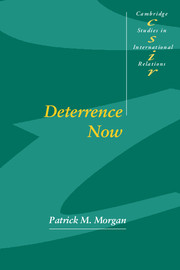Book contents
- Frontmatter
- Contents
- Acknowledgments
- List of abbreviations and acronyms
- Preface
- 1 History: deterrence in the Cold War
- 2 Deterrence and rationality
- 3 General deterrence
- 4 Testing, testing, one … two … three
- 5 Collective actor deterrence
- 6 The revolution in military affairs and deterrence
- 7 Deterrence in the post-Cold War world
- 8 Some conclusions
- References
- Index of names
- Index of subjects
- CAMBRIDGE STUDIES IN INTERNATIONAL RELATIONS
6 - The revolution in military affairs and deterrence
Published online by Cambridge University Press: 22 September 2009
- Frontmatter
- Contents
- Acknowledgments
- List of abbreviations and acronyms
- Preface
- 1 History: deterrence in the Cold War
- 2 Deterrence and rationality
- 3 General deterrence
- 4 Testing, testing, one … two … three
- 5 Collective actor deterrence
- 6 The revolution in military affairs and deterrence
- 7 Deterrence in the post-Cold War world
- 8 Some conclusions
- References
- Index of names
- Index of subjects
- CAMBRIDGE STUDIES IN INTERNATIONAL RELATIONS
Summary
In earlier drafts of this chapter, I spent a good deal of time defending the idea that a revolution in military affairs was in progress and explaining many of its main features. Events have moved faster than I have. The RMA is now much more familiar and, on the whole, much less debatable. However, little attention has as yet been given to its potential impact on deterrence, a subject quite relevant to topics in prior chapters but left undiscussed until now. Deterrence will probably be deeply affected by these important military and related changes. How?
Revolutions in military affairs
It is not certain that a revolution in military affairs is occurring or will soon. Historians have “found” such revolutions in the past but argue about just what belongs on the list. While analysts may still disagree sharply about whether another one is in the offing recent events reinforce the view that it is. The “revolution” is widely accepted in the American armed forces, is being vigorously pursued elsewhere, and is now a major element in weapons and military-related procurements. I think the revolution is unavoidable. It will change many aspects of the use of force and greatly affect deterrence. However, the discussion that follows is often speculative, because the specific course that technological change and military applications of it will take is not known.
First, we must sort out what constitutes a revolution in military affairs. There are several possibilities.
- Type
- Chapter
- Information
- Deterrence Now , pp. 203 - 237Publisher: Cambridge University PressPrint publication year: 2003

